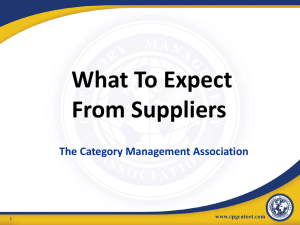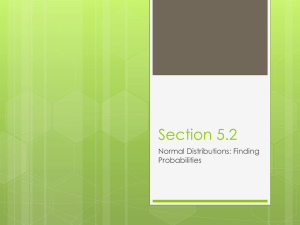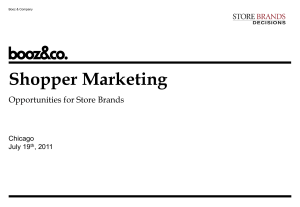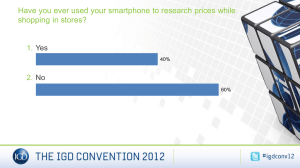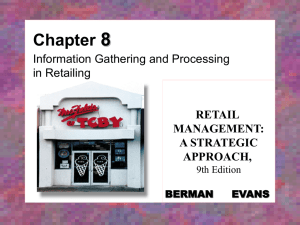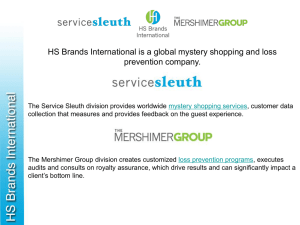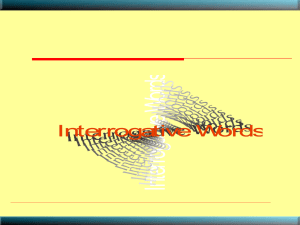Acosta-Hillshire_at_LEAD_2012
advertisement
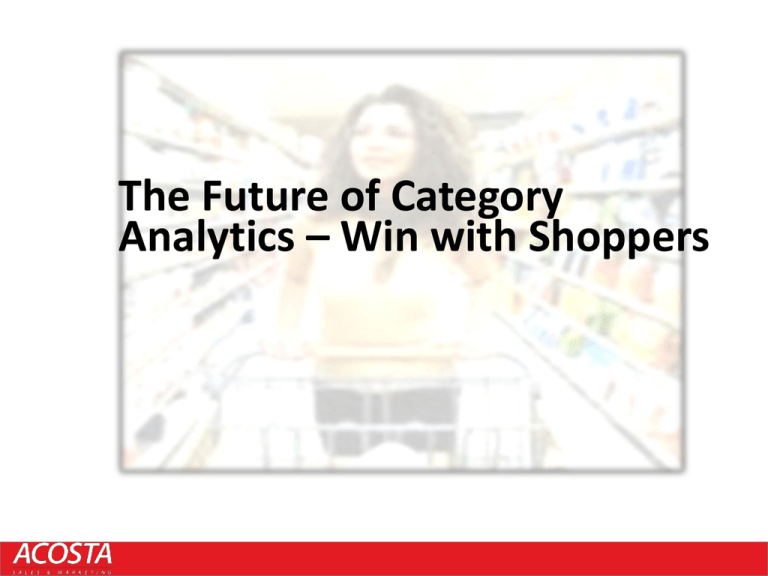
The Future of Category Analytics – Win with Shoppers Who is Acosta ACOSTA SALES Headquarter Selling Sales Customer Relationship Management Joint Business Planning Business Insights Category Management Space Management Business & Retail Analysis Loyalty Analytics Retail Merchandising Continuity Sets Projects Business Process Outsourcing Order to Invoice Invoice to Cash AMG Strategic Advisors Strategic Consulting Shopper Insights Market Research Advanced Analytics The Agency at AMG Integrated Marketing Solutions Shopper Marketing AMG Activation In-store Media, promotion and Communication Mosaic Assisted Selling Training Experiential Marketing Interactive Discussion Topics • A quick look at the evolution of category analytics • The need to focus on the shopper • New skills and methods needed • Bret Thurston • Sr. Manager Category Development – Hillshire Brands The industry is evolving back to a local shopper focus 1980’s Future Past 2012+ Local Store Control National Strategies Shopper Based Offers Local Market Advertising One Plan for the Entire Chain Neighborhood/ Precision Marketing Limited Assortment Assortment as a Differentiator Assortment customization Private Brands as a Point of Difference Private Brands as a Margin Play Private Brands as a Point of Difference Small Neighborhood Stores Larger Super Stores Neighborhood StoresMulti Formats Customer focus Efficiency focus “Shopper "focus - Everything Old is New Again(with a twist) Category Management Process-Driven Multiple Templates New Metrics like GMROI, DOS, Opp Gap, Market Coverage, etc 5 Cut the store into Micro units versus looking at how Shoppers were buying across the store Refrigerated Juice Shelf Stable Juice Loyalty programs introduced New metrics like top shopper, trips, frequency, basket affinity, conversion, etc 7 Most do not align loyalty analytics to the category management process Loyalty Analytics Who are my Shoppers? Segment Loyalty Other What are their purchase Behaviors? Trips Frequency Basket Programs Loyalty offers Category Management Category Priority, Roles and Strategies and Tactics. Assessment Assortment, Pricing, Merchandising, Shelf Placement, and Scorecards Promotions Price reductions Features Displays 8 Need to move analytics from just a category focus to shopper focus Our process is to continue the transition from traditional category management as retailers place more focus on their shoppers Store YESTERDAY TODAY Category Category Category Category CATEGORY TA Convenient, easy to shop, good variety. CATEGORY ROM Store Consumer Category Category Category Category High quality products, fun to shop, low prices. Home Delivery Store Category Category Category Category Convenient, easy to shop, good variety, low prices. Low prices, especially on HBC and Paper Products. Driven by shopper insights along the path to purchase, and is more holistic to include the aisle, department, and store. New shopper based analytical approach Strategic Discovery Phase • Understand the macroenvironmental trends impacting Shoppers • Identify Shopper traits of the Category & Brand • Identify Shopper traits of the Retailer and their position in the marketplace Tactical Opportunity Phase • Measure the retailer on the basis of Shopper KPI’s • Evaluate the size of the opportunity based on favorable changes • Define a strategic purpose Diagnostic Phase • Measure the Retailer and Category on Shopper KPI’s Execution Phase • Outline the key insights from each phase • Measure the Category and Brand on Sales KPI’s • Establish importance & implications of each insight • Dive deeper on the levers truly impacting the business • Provide recommendations to achieve a positive return Report Progress & Adjust As Needed 11 Discovery Phase Product Shopper DNA • • • • Retailer Shopper DNA What Discoveries can be made: Who does my product • Who does my store appeal to? appeal to? What need do I fulfill? • What is my position in How am I purchased? the marketplace? How/when am I • How is my store consumed? shopped? Environmental Influence • What external factors are affecting households? • What is important to the shopper? • What does the path to purchase look like? Objective: Better understand who the shopper is at the Product and Retailer level, how they purchase the Product and shop the Retailer, and identify environmental issues that are affecting purchasing decisions. 12 Key Trends Impacting Our Industry 1. Shopper Landscape is Changing 2. Digital is Here and Growing Quickly 3. Retail Landscape is Changing 4. Marketing Spend is Shifting 5. Success is Driven by Innovative Growth Strategies 4/8/2015 Slide 13 Tale of Two Shoppers Millennial Generation Generational Boomer Generation Economic >$100k per year Multi-cultural General Population <$45k per year MultiCultural Source:AMGSA WBTB “Older consumers tend to use the new technology to do old things. Younger consumers use the new technology to do new things.” -Antone Gonsalves, “Gen Y Taking Technology to New Level” Digital is Here and Growing Quickly • The typical consumer spent 4% of their grocery budget over the internet • 52% of shoppers are using digital tools on the path to obtaining grocery goods • 32% of shoppers said they reclaimed online coupons • 31% used mobile phones for making lists, searching for recipes, and similar activities • 23% checked prices at multiple stores on the web before buying • Shoppers are buying online mainly for convenience (both shopping and delivery) and lower prices The Web Has “Quietly Encroached” on the Grocery Sector 4/8/2015 Slide 16 Many changes in how shoppers view the shopping landscape Dollar General (*Prototype) Grab & Go at CVS Target pFresh Source: Kantar Retail , Nielsen Walgreens Expands Fresh Opportunity Phase Buyer Conversion • Is the Retailer converting Shoppers into buyers? • What is the value of increasing conversion rates? Share of Wallet • How much of the Shoppers’ spend is captured by the Retailer? Leakage • If the sale is not captured at the Retailer, where is it going? • How does the competition treat the category? Objective: Establish consistent measures to benchmark Retailer store performance And identify areas of opportunity. Define a strategic purpose and quantify the value potential for the retailer. 18 Starting with a more holistic view shows shoppers are buying different categories more often at competitive retailers These are important categories that drive trips and larger baskets 19 Comparison of top 25 categories Retailer Source: IRI Reviews Latest 52 WE 1/22/12 20 If Retailer could convert Pet Food buyers at the same rate as competitors, sales would increase by $4.5MM. •Retailer buyer conversion = 33.7% •Avg conversion for other similar retailers= 40.2% $693,025 x 6.5= $4.5MM 21 Source: Nielsen Channel Facts L52 WE 7/2/2011, Nielsen Planners 52 Weeks Ending 12/24/2011 Opportunity to drive additional sales in stores within three miles of Supercenter Correlation between Pet sales to Supercenter proximity Sales 24% higher Stores less than three miles Stores more than three miles Source: ACNielsen: Spectra 22 Diagnostic Phase Objective: Evaluate category performance on the basis of Shopper and traditional sales metrics to identify the levers of sales results. 23 Execution Phase • WHAT do we know? • WHY is it important? • NOW WHAT do we do? • What is the cost? Objective: Articulate the key insights driving the business, the opportunity if addressed, and provide a clear and actionable recommendation that can be followed to close the gaps. 24 Bret Thurston Category Leadership Hillshire Brands Customer Development Focus Shopper Insights o Shopper Integration into Category Leadership Platform Capability Category Leadership Shopper Marketing o Shopper Informed o Shopper ROI’s via Shopper Marketing Development o Change Management o Link Insights to Solutions o Specific KPI improvement o Pricing and Promotion Expertise o Promotional Shopper Insights o KPI’s Against Shopper and Category o Improved Communication Advantaged Process for Shopper Development o Market Structure o Custom Shopper & Trip Segmentation o Proprietary Insight into Shopper Barriers o Supported by Well-developed Marketing and Advertising Support Consumer Needs o Merge Shopper, Category, and Retailer Needs with Insight Shopper Insights Category Leadership Shopper Marketing o Enhanced Platforms o Infused by Shopper Insight o Adv. Insight into Value & Promotion o Level Up customer loyalty Precision Merch. o Shopper/Demand Based Assortment o Shelf Optimization and Theater Driven by Barriers The Shopper’s Journey o The journey is where we learn about consumer & shopper’s emotional and rational dynamics and identify the shopper’s triggers, barriers and opportunities Pre-Shop Shop Influence of occasions and cultural assumptions about the category How the store frames the choice and directs behavior • Occasion, category and brand implications • Importance of promotion which drives channel and store choice • Understanding of the trip mission • • • • Store layout Assortment modeling, Planograms Fixture design Shopper Marketing Programs Post Shop How consumption, storage, packaging delights or frustrates • • • Promotional ROI Product developments Packaging development Hillshire Brands’ Commitment to Shopper Focused Category Leadership - Shopper Capabilities enable our strategies - Customer Focused engagement strategies enable our partnerships - Shopper Focused activation enables our success Hillshire Brands Category Leadership Guiding Principles Strong Category Leadership platforms informed with shopper/category/customer insights Clear understanding of and alignment to the customers’ category planning cycles, operational requirements, and category goals Investment in customer-facing category teams charged with driving retail partnerships and customizing our category leadership platforms to create unique activation plans for customers Disciplined approach to measuring results in order to ensure success Hillshire Brands Building Capability to Ensure reaches all customers IRI Panel POS Shipments ACNielsen Data Updates Presentation Updates Data Analysts Business Support, IT Integrate & Manage Data Hillshire Brands Category Leadership Acosta Partners Develop Insights & Recommendations Key Customers Customize. Present. Win. Enable customization and ensure ROI - Align with the customer to a level we are able to support well - Fully engage in the areas where it makes sense to invest - Ensure that we have a point of view on each of the customer’s strategies and tactics - Become experts in areas that drive our business model forward with our customers Closing thoughts Industry needs to focus on delivering new analytics to drive business insights Insights Observation Reporting Data Rich Diagnostics driving hypothesis and begin understanding the why and prescribing what next Basic analysis, tell what the data says, Smart text when possible, getting to the who, what, when, and where Common when possible, automated, national and local Multiple sources, store level upc to total store, syndicated, panel, third party observation, etc. 35 Need to develop new metrics and common language Item ranking retailer productivity by point of distribution * High ACV is>=50%, High Velocity is SPPD > Ctgry avg. WATCH OUT CONT TO GROW High ACV/Low Velocity ACV Item ranking retailer vs market High ACV/High Velocity AT RISK GROW ACV Low ACV/Low Velocity LowACV/High Velocity Velocity A learning environment is critical for consistency and to deliver the insights to participate as an “advisor” 37
